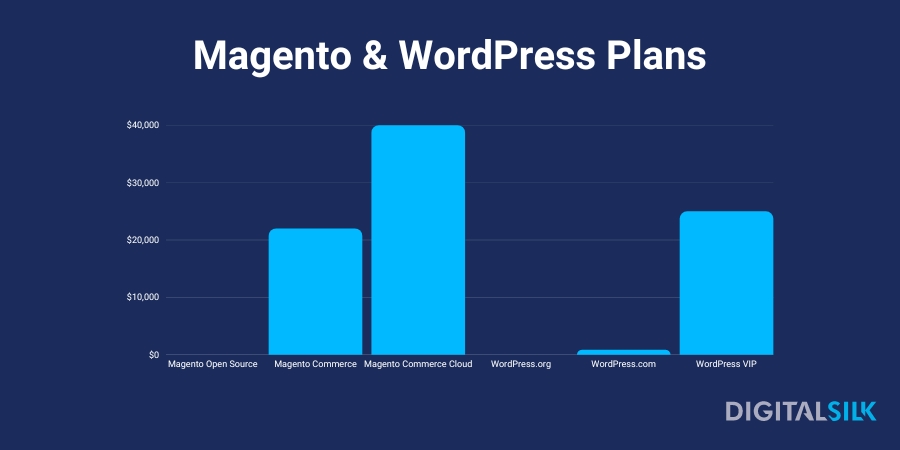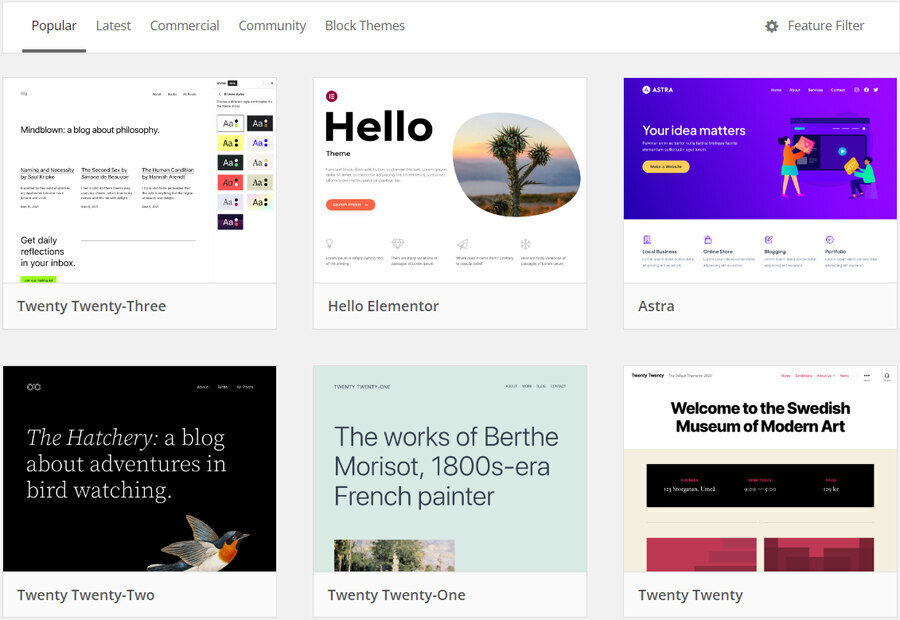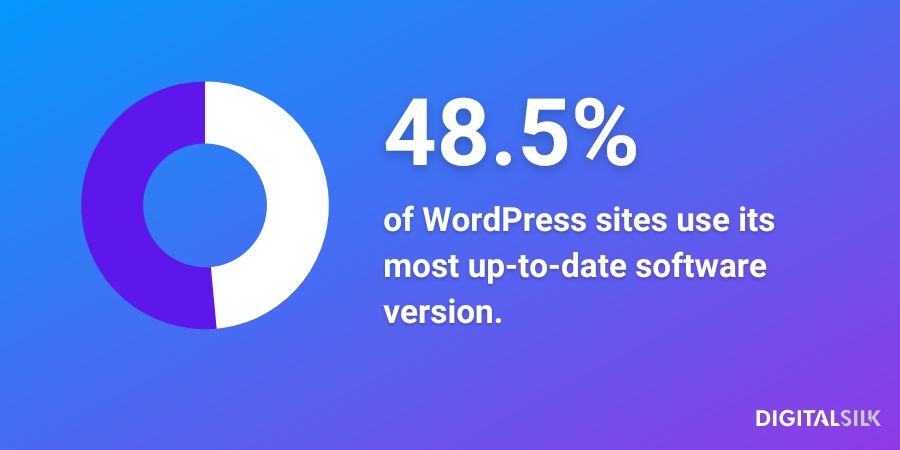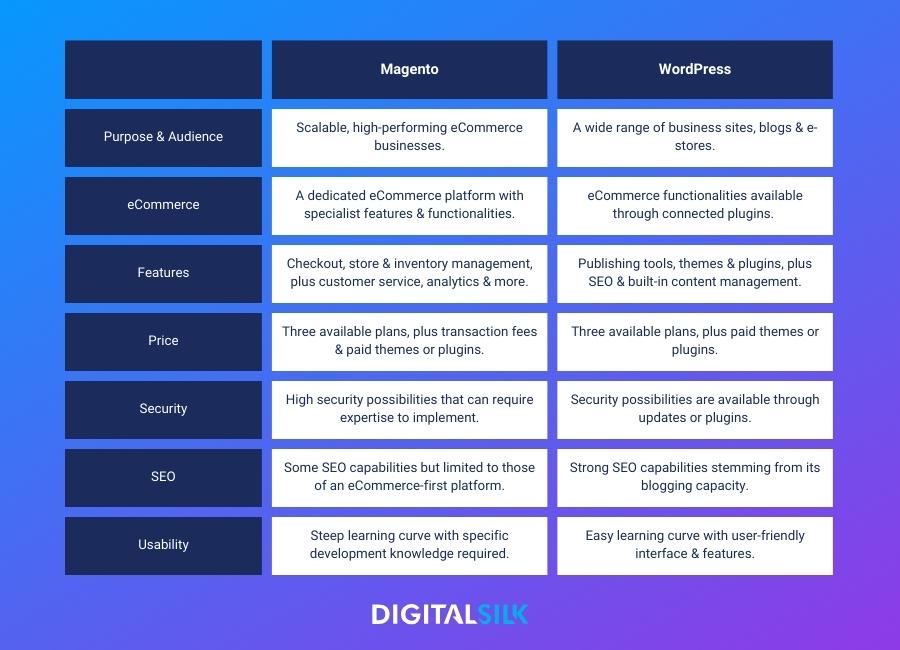Choosing the right platform for your website is crucial for achieving your business’ long-term goals.
Both industry leaders, Magento and WordPress come packed with features, functionalities and tools needed to grow your business online.
But when it comes to picking one, you may find yourself stuck at a crossroads.
So, let’s discuss the question. Magento vs. WordPress: which is the better fit for your business?
To help you decide, we will dive into the key differences, comparisons and verdicts below.
But first, let’s go back to basics.
We build custom websites and e-stores. Request a Quote
What Is Magento?
Magento, now known as Adobe Commerce, is a robust, open-source e-commerce platform that provides the possibility to create fully customizable and scalable e-stores.
Owned by Adobe, the platform uses built-in PHP and contains complex functionalities, some of which may require involvement from expert developers.
What Is WordPress?
WordPress is an open-source content management system (CMS) that enables you to build, manage and update websites.
The platform’s user-friendly backend allows anyone to upload and edit a website’s content, from expert developers to those with no coding knowledge. This is achieved through customizable features, plugins and themes.
Magento vs. WordPress: Purpose & Audience
Due to their varying capabilities and functionalities, Magento and WordPress serve different purposes that attract distinct target audiences.
Just by comparing the volume of live websites, Magento’s 142,000 to WordPress’ 35 million, we can see just how different they are.
At face value, these numbers show the difference in popularity between the two platforms. In reality, it highlights their different audiences and purposes.
What are these purposes and audiences, exactly?
- Magento is geared towards scalable, high-performing eCommerce businesses, providing dedicated features like inventory management and checkout processes to help online stores drive sales and streamline their e-store’s operations.
- Meanwhile, WordPress advertizes itself as a supporter of a wider range of websites, including business sites, blogs and e-stores. WordPress’ versatility stems from its plugins, which offer the opportunity to guide your website in the direction you wish to take it.

Which is better for your audience?
Neither Magento nor WordPress is the better option for every business. You’ll need to define your online presence’s purpose before deciding which is best for you.
Magento vs. WordPress: eCommerce
While WordPress can be extended with eCommerce plugins like WooCommerce, Magento is specifically designed with eCommerce websites in mind.
This gives Magento a direct advantage for eCommerce businesses, which is shown by its superior:
- Customization: Magento’s flexibility and tailor-made nature is well-suited for businesses with specific design and functionality requirements that might go beyond the capabilities of WordPress plugins.
- Features: Magento integrations offer the possibility for advanced product management, inventory control, order processing, shipping options and complex pricing rules. While WordPress can achieve the same with its plugins, these are often not as comprehensive or high quality.
- Scalability: From multi store management to high-level performance under heavy traffic, Magento gives growing eCommerce businesses greater control over their expanding e-store than WordPress and WooCommerce.
Which is better for eCommerce?
Your eCommerce business shouldn’t rule out the option of WordPress and WooCommerce, but overall Magento is a better option due to its direct focus on eCommerce projects.
Magento vs. WordPress: Features
Comparing Magento and WordPress’ features is equal to comparing apples and oranges. Both have a wealth of features to choose from, but their uses vary and appeal to different audiences.
What exactly belongs on the Magento and WordPress features lists?
The full lists are near-countless and will depend on your chosen pricing plan, so here are ten core categories for each:
Magento:
- Marketing, promotions and conversion tools
- SEO
- Site management
- Catalog management
- Catalog/product browsing
- Checkout, payment & shipping
- Order management
- Customer accounts, service & support
- Analytics and reporting
- Community & contributions
WordPress:
- Publishing tools
- User management
- Media management
- Full standards compliance
- Themes & plugins
- Built-in comments
- SEO
- Community & contributions
- Easy installation & upgrades
- Custom content
Which has the better features?
Magento and WordPress offer different sets of features, leading to distinct experiences depending on your business goals for your website or online store.
Magento vs. WordPress: Price
Although both Magento and WordPress offer free open-source versions, your business will face fees no matter its size or chosen plan.
Costs that span both Magento and WordPress websites include hosting, domain, security and website management costs.
However, their prices do differ on the following aspects:
1. Plan Prices
Magento offers three separate plans, each with their own pricing points and capabilities:
- Magento Open Source: Free
- Magento Commerce: Starting at $22,000 a year
- Magento Commerce Cloud: Starting at $40,000 a year
WordPress also offers three pricing plans:
- WordPress.org: Free
- WordPress.com: From $9 to $70 a month
- WordPress VIP: Starting at $25,000 a year

2. Transaction Fees
If you choose Magento for your e-store, you’ll need to consider its payment gateway fees. These are:
- Magento Open Source: 2.9% + $0.30 per transaction
- Magento Commerce: 2.9% + $0.30 per transaction
- Magento Commerce Cloud: 2.9% + $0.30 per transaction
As for WordPress, you’ll only see payment gateway fees if you are running an online store via an eCommerce plugin, like WooCommerce.
The majority of WooCommerce integrated payment gateways charge 2.9% + $0.30 per transaction, while Square, a WooCommerce extension and WordPress plugin, offers a cheaper alternative at 2.65% + $0.30 per transaction.
3. Themes & Plugins
Both Magento and WordPress offer a wealth of customizable themes, plugins and extensions that help tailor your digital experience to match your brand identity and digital strategy.
While many of these are available for free on platforms like ThemeForest and WordPress’ theme library (pictured below), plugins and themes with premium features come at a cost.
According to CodeinWP, the best-selling WordPress themes are clustered at $59. Meanwhile, Magento’s top-selling themes on ThemeForest range from $99 to $299.

Which is better for price?
If you’re looking to cut costs on your website project, WordPress is the way to go. Although WordPress websites aren’t free and will incur costs, Magento is targeted at larger businesses with complex requirements and its pricing structure shows this.
Magento vs. WordPress: Security
Both Magento and WordPress have developed into secure systems with optional extensions to further secure your website.
Let’s explore both in more detail:
To properly protect your e-store from cyberattacks there are several Magento security steps to take.
These include:
- Purchasing security app extensions, and
- keeping your Magento account up to date.
Both these steps require time and technical knowledge and are best managed with the support of a Magento development company.
Like with Magento, there are steps you can take to improve your WordPress website’s security.
One of these steps is hardening your WordPress site against security breaches, but this relies on keeping your site updated, something only 48.5% of WordPress websites adhere to.
The positive here is that updating your WordPress website or downloading new plugins is less technical than Magento, removing the need for extensive development knowledge.

Which is better for security?
Your website’s security truly depends on the decisions you make and not just the platform you choose. While a well-optimized Magento website can be protected from breaches and attacks, your WordPress website can achieve the same level of security with the right, up-to-date plugins.
Magento vs. WordPress: SEO
Magento includes SEO features that help create an SEO-optimized e-store, but WordPress offers a wider range of SEO possibilities.
SEO is important for both Magento and WordPress websites as it relates to the process of making your website relevant, valuable and easy to find on search engines. This boosts traffic and the authority of your website in the eyes of Google and other web browsers.
With the introduction of Magento 2, users can better benefit from a range of SEO aspects, including:
- Meta tags
- Mobile-friendly site designs
- Improved search engine features
- XML sitemaps
- Alt tags & image optimization
And what about WordPress? Originally a blogging platform, WordPress’ SEO capabilities have adapted to now cater for all types of websites.
On top of the SEO possibilities similar to those provided by Magento, WordPress offers a wealth of SEO plugins, such as YOAST SEO and WP Rocket.
These plugins provide user-friendly dashboards that allow you to tailor and optimize your website’s on- and off-page SEO as you wish.
Which is better for SEO?
For an eCommerce platform, Magento’s SEO capabilities are one of its core benefits. However, with its blogging background and ability to be completely customized, WordPress is the best choice for building an SEO-optimized website.
Magento vs. WordPress: Usability
The usability of Magento and WordPress will be affected by their learning curves, which refers to the time it takes to understand how to operate the platform professionally.
So, what are the learning curves of Magento and WordPress?
- Magento: A steeper learning curve that requires coding knowledge and development expertise to master.
- WordPress: A gentler learning curve accessible to a wide range of users, including beginners, thanks to its user-friendly interface and experience.
Which is better for usability?
WordPress offers a far simpler learning curve than Magento, making it the better choice for businesses who choose to work without the support of a web development company.
WordPress vs. Magento: Which Is Best For Your Business?
Whether you decide to run your website through WordPress or Magento is a decision that requires analysis of your unique project requirements.
The question you should ask is not: “Which is best?”
It is instead: “Which is best for my business?”
If you run a large or rapidly growing eCommerce business and have access to a team of expert developers then Magento can bring you unrivaled opportunities for digital growth.
However, if you don’t have the resources to outsource your website management, operate a smaller e-store or need a website with an alternate purpose, WordPress is always a safe and favorable option.
Let us know your thoughts by completing the poll below!
In need of a quick recap?
Take a look at our Magento vs. WordPress overview in the table below:

Magento & WordPress Examples
Having reached our verdict, how do Magento and WordPress websites look in practice?
Let’s take a look at two of our very own examples from Digital Silk:
1. Magento: EuroLux

We partnered with antique furniture business EuroLux to create a custom website design. We decided to go with Magento, as the client needed comprehensive checkout features and capabilities, such as multiple payment options and progress indicators
Our designers and developers worked with our digital strategists to create a streamlined user journey to drive sales and revenue.
2. WordPress: Rollink

Rollink’s tailor-made collapsible luggage e-store is a high-quality example of a WordPress website utilizing the WooCommerce plugin.
Our expert developers used WordPress’ flexibility and customizations to create a vibrant color scheme with engaging micro-interactions that match the brand’s visual identity.
In turn, Rollink managed to increase revenues by 500% while launching their concept to the U.S. market.
Build Your Custom e-Store With Digital Silk
Still unsure whether Magento or WordPress is the best choice for your brand?
Digital Silk’s dedicated digital strategists and web development specialists can help you pick the right path to growing your business online and set up a website that accelerates business results.
Our team of award-winning designers and specialist developers use data-driven research and innovative methodologies to provide a solution that best suits your business.
What’s more, we:
- Take project ownership
- Work with 100% transparency
- Deliver measurable results
Contact our team online, call us at (800) 206-9413 or fill in the request a quote form below to tell us about your project and receive a custom consultation.
"*" indicates required fields









